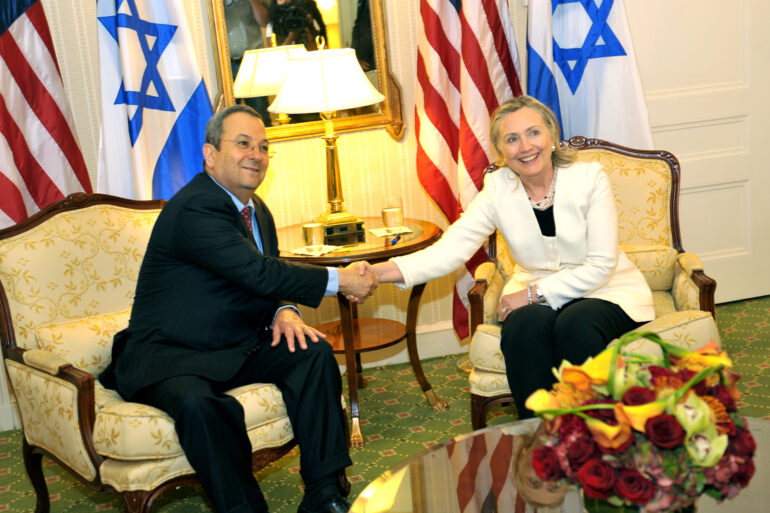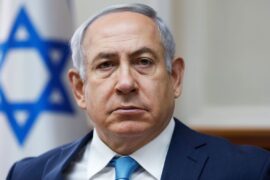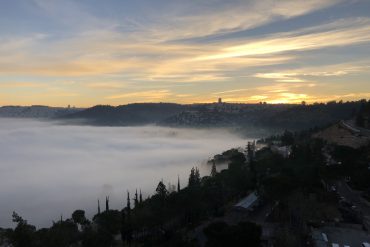Former Prime Minister Ehud Barak urged a crowd of protestors in Haifa on Saturday night to intensify the struggle to bring down Israel’s current coalition.
“We will win, because we have no other land, and we have no other way… We are in a battle for the soul and the future of Israel. It will not be easy, and it will not be short, but we are fighting as one family for everything that is dear to us, and we will win.”
“But we have not yet won the battle,” Barak warned the crowd.
“The ones conducting the [judicial] reform have not given up. They have the same goal, just a different method. Netanyahu was and is in need of time, at any cost. In order to pass a budget, to calm the winds at home, to receive an invitation to the White House, and above all, to dissolve and weaken the protest. My conclusion: This is not the time to take a break. We must not err with illusions. We must increase the protest and end the negotiations immediately.”
“To this end,” he continued. “The protest must increase and move to civil rebellion. Nonviolent disobedience.”
“The script for civil rebellion has already been written by Mahatma Gandhi, Martin Luther King, and others. I call on all Israeli civilians to prepare to act, and when the call comes – answer it. We will fight, and we will not fear anyone or anything.”
Barak’s statements aimed at accelerating the mass demonstrations should be understood within the context of how central a role he and many of his close associates have been playing in the protest movement.
Barele Crombie, who has organized several of Israel’s pro-judicial reform rallies, claimed in a recent interview that Barak is one of the largest funders of the demonstrations against Netanyahu, specifying that “Ehud Barak is funding the protest with millions if not tens of millions of shekels.”
In a podcast with Haaretz reporter Amir Oren two weeks ago, Gilead Sher — one of the main organizers of the anti-government protests who served as Barak’s chief of staff during his brief tenure as prime minister from 1999-2001— revealed that he and a small group of accomplices had created the financial and organizational structure for the mass demonstrations even before Netanyahu had formed his coalition.
What this essentially tells us is that the protests that have been destabilizing Israeli society and much of the Jewish Diaspora since January were not simply spontaneous attempts by a portion of the population to resist the government’s efforts to democratize Israel’s judiciary but actually a premeditated effort to sabotage Netanyahu and bring down whatever government he would form.
The demonstrations should therefore be seen not as a protest against judicial reform legislation but rather as a protest against November’s election results and the socio-political direction Israel has been moving in.
Speaking to Oren on the podcast, Sher revealed that his plan to paralyze the country was hatched roughly three weeks before the government was formed. In a meeting hosted by Yossi Kutchik, who served as the director general of Barak’s office when he was prime minister, Sher and Kutchik met with high-tech billionaire Orni Petruschka and former IDF Chief of Staff Dan Halutz.
According to Sher, “The four of us met and very quickly, maybe a week or two, we were joined by a number of other people.”
Among others, Sher mentioned Shikma Bressler, who first gained notoriety in 2020 as head of the “Black Flags” group of anti-Netanyahu protesters. As Israel’s Channel 13 revealed in early 2020, Bressler’s efforts to bring down Netanyahu were financed by Ehud Barak.
Sher’s claims were later supported by veteran organizer Eldad Yaniv.
Yaniv had been a senior adviser to Ehud Barak during the 1999 election campaign in which United States President Bill Clinton dispatched James Carville and a team of American political operatives to help Barak defeat Netanyahu.
Despite the fact that he has reportedly maintained close ties with Barak over the years and despite the fact that he had organized protests in 2017 calling for the attorney general to indict Netanyahu, Yaniv told Israel’s Channel 11 following Sher’s interview that he had been approached prior to the November 2022 elections by the same people that had approached Sher. They had seen polling data that Netanyahu and his political allies would win on election day and wanted Yaniv to begin planning mass demonstrations against the coalition they expected Netanyahu to form.
According to Yaniv, he declined the offer because he believes that the public has a right to be led by the representatives it democratically elects.
In terms of who approached Yaniv – and later Sher – the answer should be obvious. The protest movement financed and organized by Barak’s political confidants are something straight out of a CIA playbook. It’s what the US empire does whenever a small nation it controls appears to be drifting out of its orbit. Barak has long positioned himself as Uncle Sam’s man in Jerusalem – especially when the empire has a Democrat in the White House.
In recent months, substantial evidence has emerged linking Washington with the anti-government protests.
In late April, Justice Minister Yariv Levin (Likud) was caught on a video published by Walla! News telling Ḥaredi political operatives that the Biden administration “is working in cooperation with them [the anti-government protest organizers] on this, as you can see from the things said by the people in the government there.”
While Israeli protestors certainly have legitimate concerns regarding some of the details of Levin’s judicial reforms that appear to centralize significant power in the government’s hands at a time when the sectors of Israeli society connected to Jewish identity and tradition are growing at the expense of those committed to liberalism and Western values, their fears have been cynically pounced upon and exploited by local elites acting on behalf of Washington.
It’s also worth noting an important distinction between the positions of many of the Israeli protestors and those of the Biden administration. While most Israelis overwhelmingly support some form of judicial reform in order to bring balance between the state’s branches of government, the Americans appear committed to ensuring that Israel’s Supreme Court remain the nation’s most powerful institution.
In April, Ehud Barak gave voice to American concerns over Israel’s socio-cultural trajectory on Twitter, revealing that “In conversations between Israelis and Western diplomatic officials there are deep concerns raised of the possibility that if the coup in Israel succeeds, a messianic dictatorship will be established in the heart of the Middle East, which has nuclear weapons, and fanatically wishes for a confrontation with Islam centered on the Temple Mount.”
By coup, Barak meant the democratic empowerment of “second Israel” (Mizraḥi, Ḥaredi, and national-religious Jews that have all felt marginalized by the more westernized “first Israel” since the state’s establishment) through their elected representatives – a prospect that causes concern for those who prefer to see Israel as an outpost of US power in the Semitic region (or a “villa in the jungle” as Barak himself once famously put it).
The fact that a one-time kibbutznik and special forces commando has become so obscenely wealthy serving the interests of empire at the expense of his people reveals the deep contradictions inherent in Labor Zionist thought.





